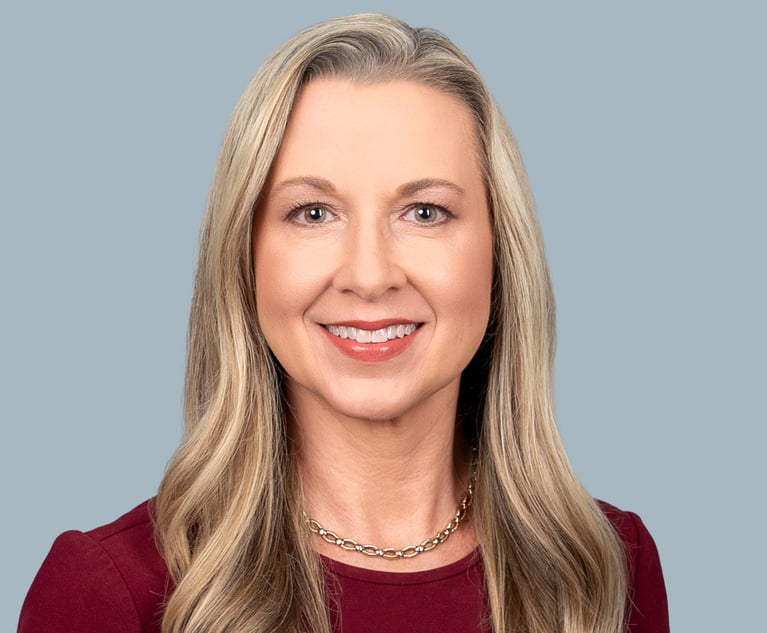 John Blood, General Counsel, left, and Matthew Galvin, Global Legal Director, right, of Anheuser-Busch InBev in their New York City office, on Monday, April 30, 2018.
John Blood, General Counsel, left, and Matthew Galvin, Global Legal Director, right, of Anheuser-Busch InBev in their New York City office, on Monday, April 30, 2018.AB InBev Toasts to Its New Path on Due Diligence and Compliance
The brewing giant used truly unconventional and high-tech methods to transform compliance on a global scale.
May 18, 2018 at 11:15 AM
7 minute read
Got a compliance issue? Anheuser-Busch InBev, the world's largest brewer of beers, has an app for that, serving its 205,000 employees spread throughout 90 countries around the world.
The compliance app and website were part of innovations undertaken by the legal department at the Leuven, Belgium-based brewery that is home to some of the world's most famous beer brands, including Budweiser, Corona and Stella Artois. The department's unconventional and high-tech strategies, carried out on a truly global scale, earned it the 2018 award for Best Legal Department in the compliance category.
As has happened at other companies, a high-profile merger spurred big legal department changes. In October 2016, AB InBev, as it is called, acquired London-based SABMiller in a $100 billion deal. The acquisition added 50,000 employees and 65 more countries to AB InBev's operations.
General counsel John Blood says the legal department faced a massive three–part challenge: integrating compliance into every function of the new company; making the compliance program quickly accessible to every employee in every country; and, gauging and managing compliance risks in countries where AB InBev had not previously operated.
“We needed to do our due diligence and know the compliance space in Africa, Australia and other countries where we had little or no experience,” Blood says. “The traditional way would be to hire teams of accountants and lawyers at a high cost to go into each operation and do a full-scale books and records investigation.”
But Blood's team did not take the traditional path. His team, including global legal director Matt Galvin and global compliance/antitrust/litigation head Martim Della Valle, were already pushing to invest in more data analytics. For much less money, they envisioned aggregating all accounting and compliance data into a central analytics platform that would live and grow with the company.
Instead of sending teams of professionals all over the world to collect data, the legal team brought the data to it. They designed investigations and due diligence software and rolled the technology out to every operation across the world.
“And instead of coming out of it with a big report in a binder,” Della Valle says, “we built an ongoing program to help take our compliance program to the next level.”
Called BrewRight, the program includes algorithms and dashboards to use as tools going forward, as well as artificial intelligence that allows BrewRight to learn from past behavior. The last time AB InBev did a deep due diligence investigation of this type, it cost the company $1.8 million. With BrewRight, built with in-house talent working with outside coders and vendors, it only cost $200,000.
Galvin says the legal team can use the new system to look at sales conduct in Ghana, or how much cash is on hand in Algeria, or who the biggest vendors are in Brazil. “We can aggregate and risk score every vendor and every transaction in the world,” he explains.
The lawyers can also use the analytics in other ways, such as to compare internal investigations to see if one investigator takes much longer than others, or to spot trends in areas like sexual harassment complaints.
“We can also get a composite risk score,” he says. “We can score every one of our operations for corruption, fraud, money laundering and such, then choose to put our resources where the highest risk is.”
Galvin sees the system as being in year two of a five-year plan. “As the case management system teaches and gets smarter, the underlying data will get better, transparency will be magnified, risk scores more accurate using a regression analysis,” he says.
The next big step, Galvin says, is predicting fraudulent behavior before it happens. Blood, the GC, explains that the system now can red flag an unusual payment, say, from its size, or round numbers, or lack of backup documentation. When the compliance team further investigates, it enters false hits and positive hits so that the system can learn.
“The next step,” he says, “is before a payment is actually made, the system would be able to predict [possible fraud] because of something about the payment, its nature or timing, or something about the vendor. It won't say proper or improper, but it would say to inquire more.” Blood says he was fortunate to have a legal team that “has a passion for data analytics and for working with the information technology team.”
At the end of the day, Blood adds, “your data is only as good as the humans who make judgments about where to look, how to analyze it, when to tweak it, what is meaningful and what isn't. Many factors go into it. It is very much a human process.”
The compliance team is made up of about 60 professionals, including lawyers, accountants and computer scientists. IT is part of the compliance team, Galvin explains.
The company further emphasizes compliance by tying it to other objectives that employees must meet to receive bonuses. “We are very good at attaching hurdles and compliance challenges to bonus payments,” Galvin says.
In addition the legal team last year completed and rolled out an application called Compliance Channel. It includes a website platform that supports the whole compliance program and an app available in both Apple's App Store and Google Play—making the program easily accessible to every employee.
Through the app, everyone can see or upload all of the company's policies as well as have access to the anonymous whistleblower helpline.
So far the greatest use of the app, Galvin says, has been in Africa. “It really helped 14 businesses there right away,” he says.
Data about possible risks flows into the website from countries around the world, and the website generates advice on the compliance implications, including raising red flags if necessary or asking for more information. There is also a workflow for analyzing new suppliers depending on their risk levels.
Della Valle says the legal team also used the technology to do a substantial antitrust risk assessment and took a number of remedial actions. “This is permanent, and we will keep doing it every year moving forward, refreshing the exercise and addressing potential new issues and concerns,” he explains.
Della Valle says he is working on a pilot project in Europe to take compliance even further, using behavioral science. The key is better understanding how to influence the choices that people make, so that, in effect, the default choice is also the compliant one.
“I truly believe this is the future of compliance,” he says.
For their herculean efforts, AB InBev's in-house team won a 2017 Financial Times award for innovation in data, knowledge and intelligence.
And Blood is always ready to talk to other GCs about the system. “Ultimately, our vision is to share it with others,” he says. “We think it could be a solution for other companies.”
This content has been archived. It is available through our partners, LexisNexis® and Bloomberg Law.
To view this content, please continue to their sites.
Not a Lexis Subscriber?
Subscribe Now
Not a Bloomberg Law Subscriber?
Subscribe Now
NOT FOR REPRINT
© 2025 ALM Global, LLC, All Rights Reserved. Request academic re-use from www.copyright.com. All other uses, submit a request to [email protected]. For more information visit Asset & Logo Licensing.
You Might Like
View All

NLRB Blisters Skilled Care Home Chain That Terminated Nursing Assistant Who Complained About Wages
6 minute read
Ex-Six Flags CLO Lands New C-Suite Post—This Time as HR Chief
Trending Stories
- 1The Appropriate Exemption in Students for Fair Admissions v. President & Fellows of Harvard College
- 2DOJ, 10 State AGs File Amended Antitrust Complaint Against RealPage and Big Landlords
- 3New Partners at Cummings & Lockwood, Carmody Torrance Sandak & Hennessey
- 4'Extra Government'?: NY Top Court Eyes Ethics Commission's Constitutionality
- 5South Texas College of Law Houston Selects New Dean
Who Got The Work
Michael G. Bongiorno, Andrew Scott Dulberg and Elizabeth E. Driscoll from Wilmer Cutler Pickering Hale and Dorr have stepped in to represent Symbotic Inc., an A.I.-enabled technology platform that focuses on increasing supply chain efficiency, and other defendants in a pending shareholder derivative lawsuit. The case, filed Oct. 2 in Massachusetts District Court by the Brown Law Firm on behalf of Stephen Austen, accuses certain officers and directors of misleading investors in regard to Symbotic's potential for margin growth by failing to disclose that the company was not equipped to timely deploy its systems or manage expenses through project delays. The case, assigned to U.S. District Judge Nathaniel M. Gorton, is 1:24-cv-12522, Austen v. Cohen et al.
Who Got The Work
Edmund Polubinski and Marie Killmond of Davis Polk & Wardwell have entered appearances for data platform software development company MongoDB and other defendants in a pending shareholder derivative lawsuit. The action, filed Oct. 7 in New York Southern District Court by the Brown Law Firm, accuses the company's directors and/or officers of falsely expressing confidence in the company’s restructuring of its sales incentive plan and downplaying the severity of decreases in its upfront commitments. The case is 1:24-cv-07594, Roy v. Ittycheria et al.
Who Got The Work
Amy O. Bruchs and Kurt F. Ellison of Michael Best & Friedrich have entered appearances for Epic Systems Corp. in a pending employment discrimination lawsuit. The suit was filed Sept. 7 in Wisconsin Western District Court by Levine Eisberner LLC and Siri & Glimstad on behalf of a project manager who claims that he was wrongfully terminated after applying for a religious exemption to the defendant's COVID-19 vaccine mandate. The case, assigned to U.S. Magistrate Judge Anita Marie Boor, is 3:24-cv-00630, Secker, Nathan v. Epic Systems Corporation.
Who Got The Work
David X. Sullivan, Thomas J. Finn and Gregory A. Hall from McCarter & English have entered appearances for Sunrun Installation Services in a pending civil rights lawsuit. The complaint was filed Sept. 4 in Connecticut District Court by attorney Robert M. Berke on behalf of former employee George Edward Steins, who was arrested and charged with employing an unregistered home improvement salesperson. The complaint alleges that had Sunrun informed the Connecticut Department of Consumer Protection that the plaintiff's employment had ended in 2017 and that he no longer held Sunrun's home improvement contractor license, he would not have been hit with charges, which were dismissed in May 2024. The case, assigned to U.S. District Judge Jeffrey A. Meyer, is 3:24-cv-01423, Steins v. Sunrun, Inc. et al.
Who Got The Work
Greenberg Traurig shareholder Joshua L. Raskin has entered an appearance for boohoo.com UK Ltd. in a pending patent infringement lawsuit. The suit, filed Sept. 3 in Texas Eastern District Court by Rozier Hardt McDonough on behalf of Alto Dynamics, asserts five patents related to an online shopping platform. The case, assigned to U.S. District Judge Rodney Gilstrap, is 2:24-cv-00719, Alto Dynamics, LLC v. boohoo.com UK Limited.
Featured Firms
Law Offices of Gary Martin Hays & Associates, P.C.
(470) 294-1674
Law Offices of Mark E. Salomone
(857) 444-6468
Smith & Hassler
(713) 739-1250







